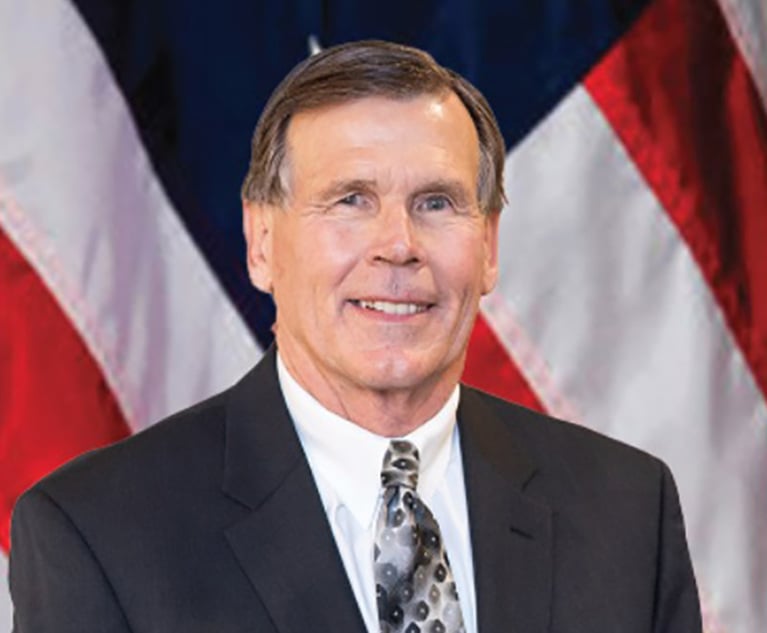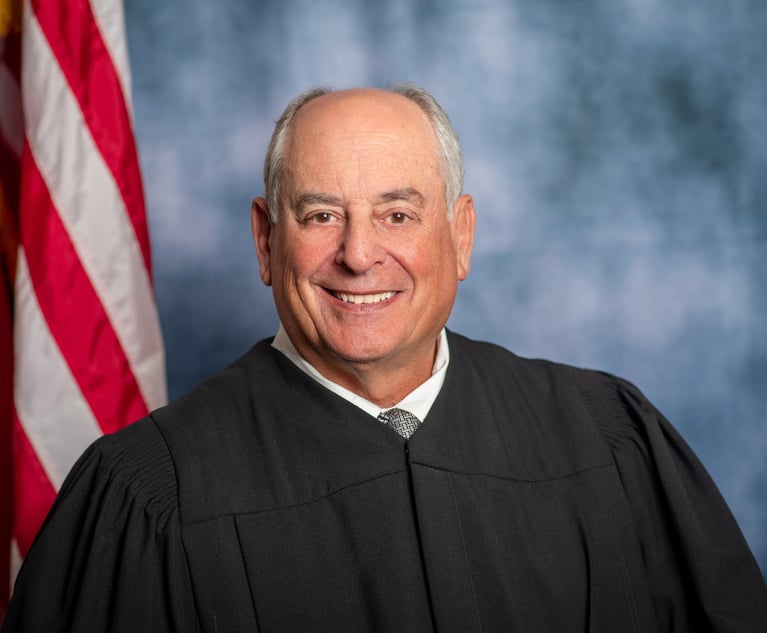 Sean J. Young of the ACLU speaks from a lectern during a press conference outside the federal courthouse in Atlanta on Monday. (Photo: John Disney/ALM)
Sean J. Young of the ACLU speaks from a lectern during a press conference outside the federal courthouse in Atlanta on Monday. (Photo: John Disney/ALM)Federal Judge Hears Abortion Law Arguments in Packed Courtroom
"I recognize I'm not going to be the last word on this," said Judge Steve Jones of the U.S. District Court for the Northern District of Georgia.
September 23, 2019 at 04:44 PM
5 minute read
Nothing was decided, but plenty was said Monday during the first hearing in Atlanta's federal court over a challenge to Georgia's new law restricting abortion.
As soon as he entered, Judge Steve Jones of the U.S. District Court for the Northern District of Georgia took note of the crowd of litigants, lawyers, lawmakers, activists, concerned citizens and reporters.
"I'm going to be lonely in this courtroom tomorrow," he said.
Then he listened for nearly two hours to four different lawyers for the litigants.
Activists challenging the law were asking for a temporary injunction blocking it while their lawsuit is pending. The state argued that no injunction is necessary because the case can be decided before the law takes effect Jan. 1.
Jones said he has the case on a four-month track, on which a trial would be held after the law had already taken effect. He left a window open for the parties to agree to expedite the process by shortening or eliminating discovery to speed things up. But he said he believes they need some discovery, even if it's abbreviated.
The arguments and the judge's many questions seemed to suggest that an injunction will be granted and that a bench trial will take place in early 2020. But Jones reserved judgment, saying he would take all the arguments under advisement and rule soon.
Jones closed the hearing with the point that underscored the day's proceedings.
"I recognize I'm not going to be the last word on this," Jones said.
Indeed, supporters of the bills in Georgia and other states have said their hope is that the U.S. Supreme Court will hear their appeals and overturn Roe v. Wade, the landmark decision affirming a woman's right to choose whether to continue a pregnancy up until the point of viability—when a baby could survive after birth.
SisterSong Women of Color Reproductive Justice Collective is among the plaintiffs in the suit which names Georgia Gov. Brian Kemp, Attorney General Chris Carr and prosecutors around the state as defendants.
Out-of-town lawyers spoke for the plaintiffs and the governor. Atlanta lawyers spoke for two district attorneys who were also sued.
First up was Susan Talcott Camp of the American Civil Liberties Union Foundation, speaking for SisterSong and a long list of doctors, clinics and medical providers.
"This is a simple case," Camp said. "Georgia cannot ban abortion before viability." Camp said the judge is bound by more than 50 years of U.S. Supreme Court precedent, dating back to Roe v. Wade.
"Until viability, the state must respect a woman's authority to make her own decision, with her pastor, mom, intimate partner and whoever she invites into that circle," Camp said.
Jones began asking Camp questions in the first five minutes, focusing largely on the plaintiff's vagueness claim—which could be used to void the law.
"At best it's vague," Camp said several times. "At worst, it simply operates as a ban."
But the state's counsel said the law is not a ban on previability abortion because it allows the procedure before a heartbeat can be detected—and after, in cases where the mother will die otherwise, or when a woman has filed an official police report charging rape or incest.
Attorney General Chris Carr and Solicitor General Andrew Pinson, tasked with defending the state, have hired outside counsel: Jeffrey M. Harris of Consovoy McCarthy from Washington, D.C.
Harris was not at the hearing Monday, but his partners Patrick Strawbridge and Steven Begakis were. Strawbridge made the argument for the governor and the attorney general.
Jones also questioned Strawbridge about the vagueness claim and the defense to it.
"The Supreme Court has been very clear," Strawbridge said. "The void for vagueness challenge carries a very heavy burden. They cannot meet their heavy burden."
While Camp repeatedly used the term "ban" to describe the law, Strawbridge referred to it as "the LIFE Act."
"We don't think this is a ban," Strawbridge said. He said it's a reflection of a "sincerely held belief by people in this state and by people of all colors and genders."
The case is SisterSong v. Kemp, No. 1:19-cv-02973-SCJ.
The complaint is a constitutional challenge to House Bill 481, which the state calls "the Living Infants Fairness and Equality Act." The governor signed it into law on May 7. The law is one of dozens around the country that supporters call a "heartbeat bill" because it bans abortion from the point when a doctor can pick up a pulse on an ultrasound. That can be as early as six weeks into pregnancy, according to the statute. Opponents say the name is intentionally misleading because no heart has yet formed in what would be a tiny collection of cells. The law gives the embryo the full rights of citizenship and provides for the possibility of criminal prosecution for violations.
This content has been archived. It is available through our partners, LexisNexis® and Bloomberg Law.
To view this content, please continue to their sites.
Not a Lexis Subscriber?
Subscribe Now
Not a Bloomberg Law Subscriber?
Subscribe Now
NOT FOR REPRINT
© 2025 ALM Global, LLC, All Rights Reserved. Request academic re-use from www.copyright.com. All other uses, submit a request to [email protected]. For more information visit Asset & Logo Licensing.
You Might Like
View All

North Carolina Courts Switch to Digital, Face Extreme Weather in 2024

'A 58-Year-Old Engine That Needs an Overhaul': Judge Wants Traffic Law Amended
3 minute readTrending Stories
- 1Tensions Run High at Final Hearing Before Manhattan Congestion Pricing Takes Effect
- 2Improper Removal to Fed. Court Leads to $100K Bill for Blue Cross Blue Shield
- 3Michael Halpern, Beloved Key West Attorney, Dies at 72
- 4Burr & Forman, Smith Gambrell & Russell Promote More to Partner This Year
- 5Sanctions Order Over Toyota's Failure to Provide English Translations of Documents Vacated by Appeals Court
Who Got The Work
Michael G. Bongiorno, Andrew Scott Dulberg and Elizabeth E. Driscoll from Wilmer Cutler Pickering Hale and Dorr have stepped in to represent Symbotic Inc., an A.I.-enabled technology platform that focuses on increasing supply chain efficiency, and other defendants in a pending shareholder derivative lawsuit. The case, filed Oct. 2 in Massachusetts District Court by the Brown Law Firm on behalf of Stephen Austen, accuses certain officers and directors of misleading investors in regard to Symbotic's potential for margin growth by failing to disclose that the company was not equipped to timely deploy its systems or manage expenses through project delays. The case, assigned to U.S. District Judge Nathaniel M. Gorton, is 1:24-cv-12522, Austen v. Cohen et al.
Who Got The Work
Edmund Polubinski and Marie Killmond of Davis Polk & Wardwell have entered appearances for data platform software development company MongoDB and other defendants in a pending shareholder derivative lawsuit. The action, filed Oct. 7 in New York Southern District Court by the Brown Law Firm, accuses the company's directors and/or officers of falsely expressing confidence in the company’s restructuring of its sales incentive plan and downplaying the severity of decreases in its upfront commitments. The case is 1:24-cv-07594, Roy v. Ittycheria et al.
Who Got The Work
Amy O. Bruchs and Kurt F. Ellison of Michael Best & Friedrich have entered appearances for Epic Systems Corp. in a pending employment discrimination lawsuit. The suit was filed Sept. 7 in Wisconsin Western District Court by Levine Eisberner LLC and Siri & Glimstad on behalf of a project manager who claims that he was wrongfully terminated after applying for a religious exemption to the defendant's COVID-19 vaccine mandate. The case, assigned to U.S. Magistrate Judge Anita Marie Boor, is 3:24-cv-00630, Secker, Nathan v. Epic Systems Corporation.
Who Got The Work
David X. Sullivan, Thomas J. Finn and Gregory A. Hall from McCarter & English have entered appearances for Sunrun Installation Services in a pending civil rights lawsuit. The complaint was filed Sept. 4 in Connecticut District Court by attorney Robert M. Berke on behalf of former employee George Edward Steins, who was arrested and charged with employing an unregistered home improvement salesperson. The complaint alleges that had Sunrun informed the Connecticut Department of Consumer Protection that the plaintiff's employment had ended in 2017 and that he no longer held Sunrun's home improvement contractor license, he would not have been hit with charges, which were dismissed in May 2024. The case, assigned to U.S. District Judge Jeffrey A. Meyer, is 3:24-cv-01423, Steins v. Sunrun, Inc. et al.
Who Got The Work
Greenberg Traurig shareholder Joshua L. Raskin has entered an appearance for boohoo.com UK Ltd. in a pending patent infringement lawsuit. The suit, filed Sept. 3 in Texas Eastern District Court by Rozier Hardt McDonough on behalf of Alto Dynamics, asserts five patents related to an online shopping platform. The case, assigned to U.S. District Judge Rodney Gilstrap, is 2:24-cv-00719, Alto Dynamics, LLC v. boohoo.com UK Limited.
Featured Firms
Law Offices of Gary Martin Hays & Associates, P.C.
(470) 294-1674
Law Offices of Mark E. Salomone
(857) 444-6468
Smith & Hassler
(713) 739-1250







